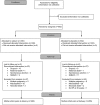Randomized, placebo-controlled, calcium supplementation trial in pregnant Gambian women accustomed to a low calcium intake: effects on maternal blood pressure and infant growth
- PMID: 24004887
- PMCID: PMC3778867
- DOI: 10.3945/ajcn.113.059923
Randomized, placebo-controlled, calcium supplementation trial in pregnant Gambian women accustomed to a low calcium intake: effects on maternal blood pressure and infant growth
Abstract
Background: Dietary calcium intake in rural Gambian women is very low (∼350 mg/d) compared with international recommendations. Studies have suggested that calcium supplementation of women receiving low-calcium diets significantly reduces risk of pregnancy hypertension.
Objective: We tested the effects on blood pressure (BP) of calcium carbonate supplementation (1500 mg Ca/d) in pregnant, rural Gambian women.
Design: The study was a randomized, double-blind, parallel, placebo-controlled supplementation trial from 20 wk of gestation (P20) until delivery (calcium: n = 330; placebo; n = 332). BP and anthropometric measures were taken at P20 and then 4 weekly until 36 wk of gestation (P36), and infant anthropometric measures were taken at 2, 13, and 52 wk postdelivery.
Results: A total of 525 (calcium: n = 260; placebo: n = 265) women had BP measured at P36 and subsequently delivered a healthy term singleton infant. Mean compliance was 97%, and urinary calcium measures confirmed the group allocation. At P20, the mean (±SD) systolic blood pressure (SBP) was 101.2 ± 9.0 and 102.1 ± 9.3 mm Hg, and diastolic blood pressure (DBP) was 54.5 ± 7.3 and 55.8 ± 7.8 mm Hg, in the calcium and placebo groups, respectively. The intention-to-treat analysis that was adjusted for confounders showed no significant effect of calcium supplementation on the change between P20 and P36 (calcium compared with placebo; mean ± SEM) in SBP (-0.64 ± 0.65%; P = 0.3) or DBP (-0.22 ± 1.15%; P = 0.8). There was no significant effect of supplementation on BP, pregnancy weight gain, weight postpartum, or infant weight, length, and other measures of growth. However, the comparability of the original randomly assigned groups may have been compromised by the exclusion of 20.7% of women from the final analysis.
Conclusions: Calcium supplementation did not affect BP in pregnancy. This result may have been because the Gambian women were adapted to a low dietary calcium intake, and/or obesity, high gestational weight gain, high underlying BP, tobacco use, alcohol consumption, and sedentary lifestyles were rare. This trial was registered at the International Standard Randomized Controlled Trial Register (www.controlled-trials.com/mrct/) as ISRCTN96502494.
Figures

References
-
- Villar J, Say L, Gulmezoglu M, Merialdi M, Lindheimer M, Betran A. Eclampsia and preeclampsia: a worldwide health problem for 2000 years Critchley H, Maclean A, Poston L, Walker J. Preeclampsia. London, United Kingdom: RCOG Press, 2003:57–72
-
- Hofmeyr GJ, Lawrie TA, Atallah AN, Duley L. Calcium supplementation during pregnancy for preventing hypertensive disorders and related problems. Cochrane Database Syst Rev 2010;8:CD001059. - PubMed
-
- Roberts JM, Pearson G, Cuttler J, Lindheimer M. Summary of the NHLBI Working Group on Research on Hypertension During Pregnancy. Hypertension 2003;41:437–45 - PubMed
-
- Xu H, Shatenstein B, Luo ZC, Wei S, Fraser W. Role of nutrition in the risk of preeclampsia. Nutr Rev 2009;67:639–57 - PubMed
-
- Belizán JM, Villar J, Gonzalez L, Campodonico L, Bergel E. Calcium supplementation to prevent hypertensive disorders of pregnancy. N Engl J Med 1991;325:1399–405 - PubMed
Publication types
MeSH terms
Substances
Associated data
Grants and funding
LinkOut - more resources
Full Text Sources
Other Literature Sources
Medical
Miscellaneous

